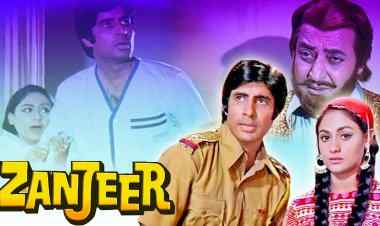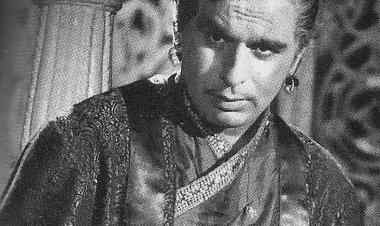Hemen Das - a highly dedicated filmmaker with a steadfast commitment to his craft
"Filmmaker Hemen Das exemplifies an unwavering commitment to his pursuits, displaying an unyielding resolve in the face of challenges and obstacles", writes film critic Prantik Deka.
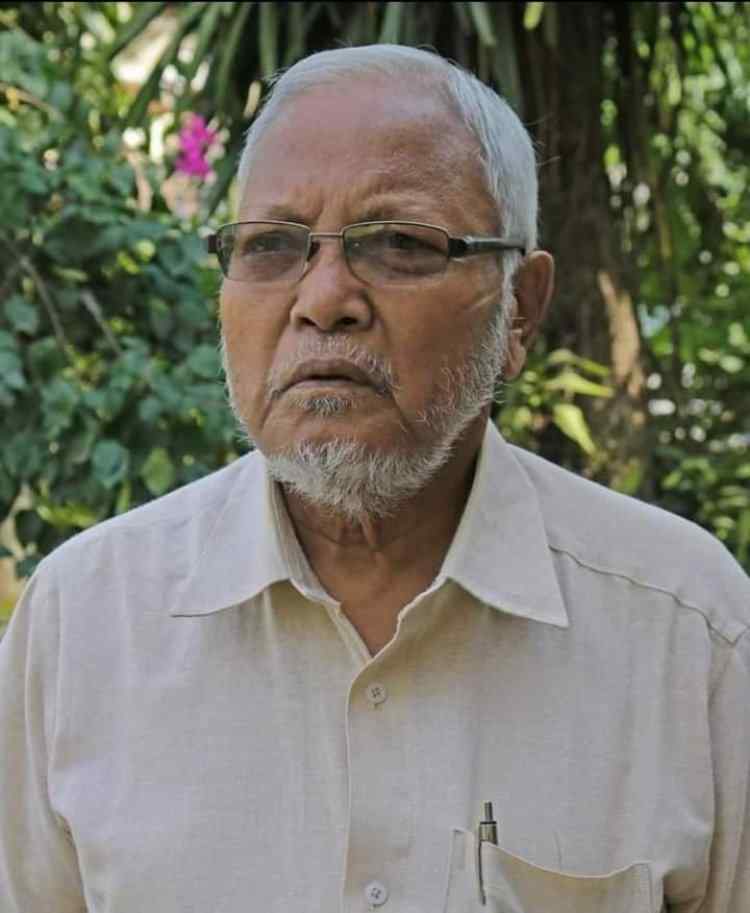
In this discourse, the film critic Prantik Deka pays homage to Heman Das, a prominent director from the state of Assam, who passed away recently.
There’s pain and heartache to the news of the recent death of the eminent Assamese filmmaker and author Hemen Das as I knew him personally in the past. He was good-natured, honest and generous to a fault. Hemen Das was very well-read, knew a lot about theatre, cinema and literature, and was very much a cinephile. He led a colourful life, indulging in all sorts of creative passions, including acting, directing and writing, and he excelled in all of these pursuits.
Hemen Das was unwavering in his dedication to the cause of his birthplace – Ahatguri, which has always been a source of his artistic inspiration. He sought to protect its honour and dignity, and to bring glory to its culture. The place with a rich socio-cultural heritage has also been the birthplace of Sahityarathi Lakshminath Bezbaroa. It's a place famous all over for its age-old traditional buffalo fights, popularly known as Moh-juj, celebrated on the occasion of Magh Bihu.
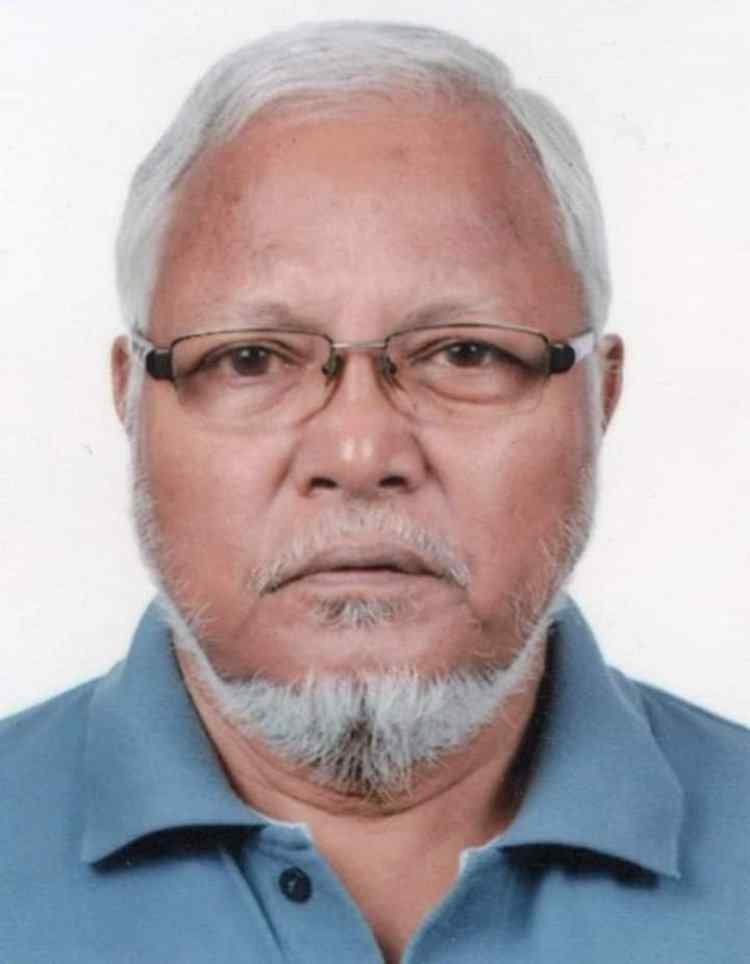
Image: Hemen Das
It was Ahatguri, located in central Assam’s Morigaon district, which became the setting of his debut film 'Jooj'. While the story primarily revolves around a buffalo-fight – a fight not just between two animals, but also between a wealthy farmer, who is a symbol of the feudal system, and a so-called small-caste farmer – the film tries to project a vivid, nuanced picture of Assam's culture and class inequality. Released in 1990, 'Jooj' managed to win the Rajat Kamal award for Best Assamese Film at the 38th National Film Awards, bringing glory to Assam in the cultural sphere. In the process, Hemen Das joined a growing list of a new wave of thinking directors. He also wrote the film's story, screenplay and dialogues. In fact, it took Das four years to find a producer for the film. It was noted actor and physician Dr Hemen Barman, who helped him find businessman Bipul Baruah, who came forward to produce the film under the banner of Mahabahu Cine Enterprise. The film featured Pulin Nath and Sitarani Hazarika in central roles, supported by Hari Deka, Dr. Hemen Barman, Shantichaya Roy, Jagdish Das, Meena Kumari Barman, Hemen Chowdhury, Lakshmi Borthakur among others. Hemen Das received Rs 5,000, while receiving the Rajat Kamal National Award.
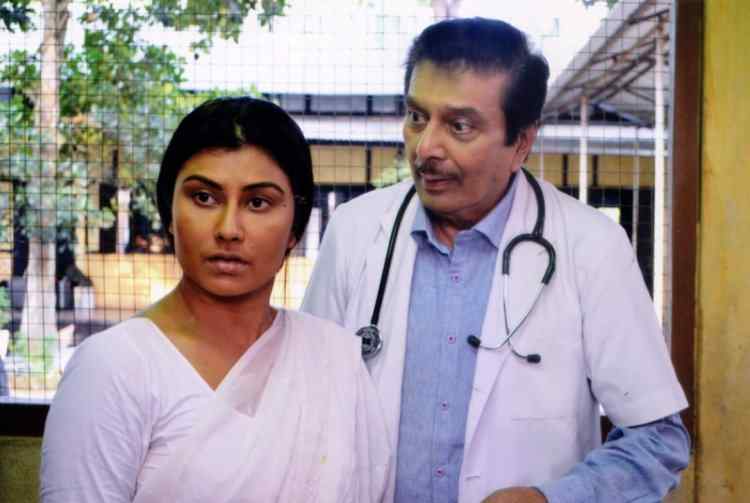
Image:
In 1994, legendary artist Dr Bhupen Hazarika, without informing anyone, paid a sudden visit to Ahatguri to witness the traditional buffalo fights held as part of Magh Bihu festivities. As he was intently watching a pair of buffalos locking horns while standing among the crowds by the side of the road, somebody spotted him and informed about his presence to the organising committee. Heman Das was also present at the location. Dr Hazarika was immediately brought upon the stage and felicitated. Dr Hazarika then spoke about a few things – "It's worth mentioning one thing here that Hemen, the worthy son of your region, has made a truly beautiful film called 'Jooj' based on this very buffalo-fight. In fact, I was one of the judges, who served on the jury of the National Film Awards for feature films at that time. The chairman was Ashok Kumar. We all saw the film and applauded it wholeheartedly." It was a proud and emotional moment for the people of Ahatguri.
In 1993, the eminent filmmaker made the realistic children's film 'Gorokhiya', which is based on a story written by renowned litterateur-journalist Homen Borgohain about the life of a cowherd boy, who drew knowledge and learning from nature. It was his immense love of nature that opened up a path of innocence, joy and amusement, and saved him from a wretched life.
Homen Borgohain also helped Hemen Das find a producer to finance this film. 'Gorokhiya's premiere show was held at the iconic Apsara Cinema Hall, which has now been transformed into a 'Marriage Hall'. The film was formally released by then Chief Minister of Assam Hiteswar Saikia in the presence of Homen Borgohain. But then, a sudden and unexpected clash of ideologies broke out between Borgohain and Hiteswar Saikia. Borgohain had left the fortnightly magazine 'Sutradhar' for the weekly newspaper 'Asom Bani' then. Unfortunately, the film never saw the light of day. The only print from the film went missing in the production office itself!
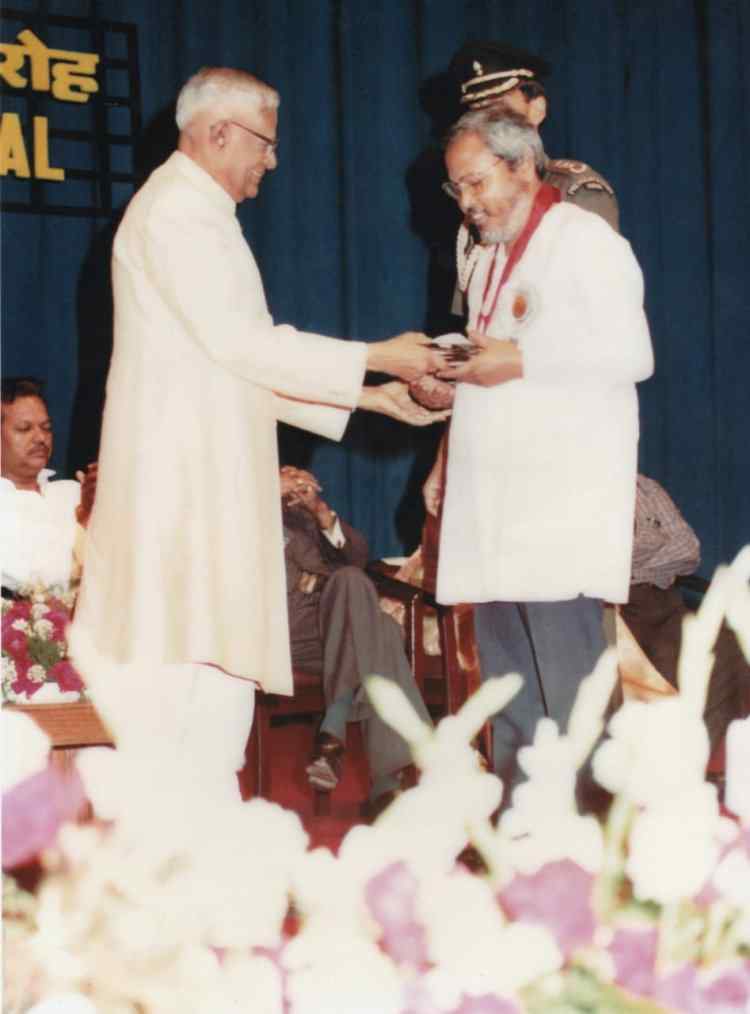
Image: Receiving the Rajat Kamal National Award from the President of India, R. Venkataraman for 'Jooj'
In 1995, Das made a remarkable telefilm – 'Aahatgurir Natun Baat', which is based on a story written by renowned dramatist and litterateur Mahendra Borthakur about the malaise of blind faith and social exploitation which has gripped the new generation.
After this, his filmmaking work seemed to have stagnated.
After a 22-year hibernation from cinema, Hemen Das emerged to direct his third and final movie 'Mriganabhi', which had a theatrical release in 2017. He was quite enthusiastic about his new project, which was based on a story by Dr Arupa Patangia Kalita, focussing on the angst of a deprived woman. Based on his own script, the film chronicles the conflict ridden life of Suntora, her uninterrupted struggle to overcome the hypocrisy and humiliation of society, which is one of the myriad problems faced by the women everywhere. Married to a wealthy, unfaithful husband, a tea planter, Suntora realises early on that as a woman, she has no liberty at all. She is just a lifeless soul, a mentally tormented woman whose freedom of self-expression has been squashed. But despite the odds going against her, Suntora finally manages to break free of the traditional expectations for women in society, by gathering her courage and will-power to stand up for her rights and dignity.
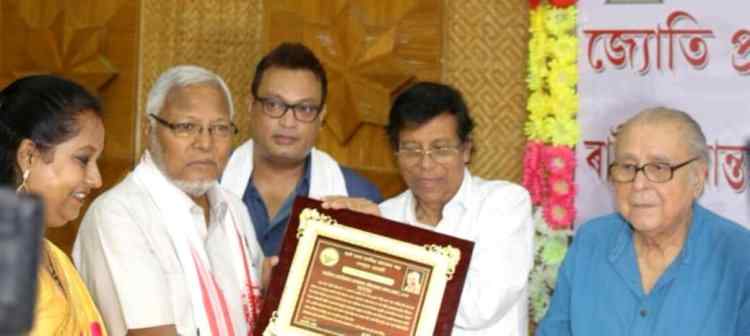
Image:Hemen Das being honoured with the Lifetime Achievers’ Award by the All Assam Cine Producers’ Association in 2018
The veteran filmmaker, enjoying a late resurgence, was careful in keeping intact the spirit of the story while creating his own vision in this project. The Assamese film industry, in the meantime, was making decent strides in terms of story-telling technique and treatment. Prastuti Parashar, who captured the essence of the protagonist with her intelligence and ability, won the Best Actress Award at the 6th Dadasaheb Phalke Film Festival, 2016. The film also fetched Tarali Sarma with the Best Music Director award at the Prag Cine Awards, in 2016. The film also starred Rajib Goswami, Jowan Dutta, Nipon Goswami, Nilu Chakravorty, Bina Baruwati, Krishna Phukan, Madhurima Chowdhury, etc.
He also directed the documentary 'Marriage Ritual of the Tribes of Arunachal Pradesh' and a video film 'Dr. Saran’s e-HRD Model', which is based on stress management.
Hemen Das, who has been involved in the field of acting since his childhood, has acted in a wide variety of roles in more than 70 plays of various forms at the State and national levels, including Ankiya Nats, jatras, modern dramas, radio plays and teleplays. He has directed more than 17 stage plays, which received critical appreciation. It was under his able leadership that plays like 'Shakxhor', 'Aami Xopnatur', 'Asami Ishwar Hazir', 'Bormanuhor Dolla', 'Maghribor Azan', 'Ahatgurir Natun Baat', etc, were successfully staged. He also showed his acting prowess in films like 'Ashroy', 'Kanaklata', 'Jooj', 'Paani', 'Itihaas', 'Jatinga Ityadi', 'Dikchow Banat Palaax', 'Mriganabhi', telefilm 'Aahatgurir Natun Baat' and Hindi mega serial 'Mrityunjoy'. He displayed an extraordinary flair with his writing skills that helped to communicate his ideas with vivid grace. Besides being a filmmaker, he has written several books in his typically lucid style, on drama, acting, film art and spirituality, including ‘Natya Silpa’, ‘Pom Khedi’, ‘Cinema Cinema’, ‘Abhinay’, ‘Akonihat – Cinema Nirman Koro Aha’, ‘Chalachitrar Prasangat’, ‘Silpachinta’, 'Bhinna Shaad' and 'Dharma, Sankardev Aru Sanskriti', which are absolute must-reads for film and theatre professionals, artistes, critics, students, enthusiasts, general readers, etal. Recently, his autobiography titled 'Hemen Dasor Varnaidyo Jeewanor Kotha' was also published. In addition to that, two of the most notable plays of Hemen Das are 'Ekhan Shanti Yuddhar Babe' and 'Kalpataru'.
He regularly used to write articles for English and vernacular newspapers, magazines and periodicals on various topics since 1970. Hemen Das, who made outstanding contributions in the fields of literature and culture, was very keen to make a movie out of eminent litterateur Manikuntala Bhattacharjya's highly appreciated novel 'Bardowani', but his wish remained unfulfilled.
In 1997, the Bharatiya Dalit Sahitya Akademi conferred him with the Dr. Ambedkar National Fellowship Award for his outstanding contribution to arts, literature and society. He was also the beneficiary of the State government's 'Assam Silpi Pension Scheme' (2010), and a one-time literary award (2012-13). The Sanskritik Mahashabha of Assam bestowed him with the Lifetime Achievement Award in 2012. The All Assam Cine Producers’ Association also honoured him with the Lifetime Achievers’ Award in 2018. The felicitation programme was then attended by eminent filmmaker, late Pulok Gogoi, popular actor Jatin Bora, President of the Association and noted writer Dilip Kumar Bora, Junmoni Khaund, noted film producer and chief guest Shankarlal Goenka, noted filmmaker, late Dara Ahmed, director Jwngdao Bodocha, noted actress Bidya Rao, the former Chairman of Jyoti Chitraban Film Studio Pabitra Margherita, among others.
It was under the dynamic initiative of Hemen Das, who once served as the North-East region's sole honorary board member of the Central Board of Film Certification, under the Ministry of Information and Broadcasting, Govt of India, that the regional office of the Film Censor Board in Guwahati was established permanently on the premises of the Jyoti Chitraban Film Studio.
Hemen Das served as a Jury Member of the Feature Film Section of the 49th National Film Awards, in 2002, as well as the Feature Film Section of the Indian Panorama, in 2002, and the Non-Feature Film category of the Indian Panorama, in 2008. He also served as a member of the Critics Jury for the 13th International Children's Film Festival of India in 2003.
Das diligently served in the Assam Secretariat, from where he retired in 2004.
"Various knowledge is required for a film director. A director needs to do a thorough research on various locations and their ambience, and the social environment that influences the thoughts and behaviours of humans. Each and every shot, visuals has to be meaningful. That's what the camera says," he had once mentioned.
Battling declining health, Hemen Das was due to receive a copy of his new book in Assamese, titled 'Biswar Shrestha Ponchas Chalachitra' (World's Best 50 Films), which was planned as a three-volume series, from the printing press, but, sadly, that was not to be. The influential filmmaker who saw film as the synthesis of all the arts, left for his heavenly abode at the age of seventy-seven. He will be fondly remembered by his son Gauri Sankar Das, District Development Commissioner, Kamrup Metro, daughter-in-law, grandson, relatives, well-wishers and the State's cultural fraternity.
***
What's Your Reaction?





















































